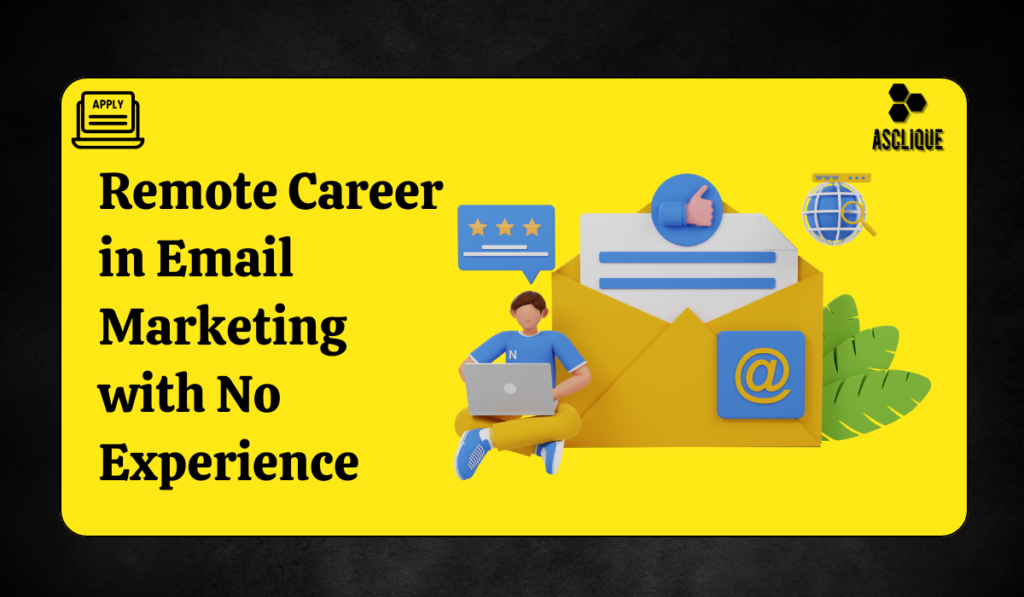Businesses are always in search of methods and avenues to engage with their target markets, which constantly evolve and are a byproduct of the digital world. Email marketing is one of the advertising methods that managed to thrive and survive the digital media landscape. Personalized content is offered to stimulate conversions, build relationships, and drive sales through direct communication with customers. Email marketing jobs Remote are growing more and more common for prospective marketers, as remote work has become standard practice in many industries.
Without any experience, though, how can one enter the realm of email marketing? An in-depth how-to for novices starting a remote email marketing job is provided in this post. All topics will be covered, including developing a portfolio, obtaining certificates, and getting experience.
Why Email Marketing is Perfect for Remote Work
Email marketing is fully digital-first, meaning most tasks—constructing campaigns, writing copy, analysis—are something you can do anywhere in the world with just an internet connection. For this reason, it is not entirely impossible to work from home. Here is why remote email marketing jobs are an excellent option for newcomers:

- Flexibility: Remote work can be done from the comfort of home or any other location, giving flexible work-life balance.
- High demand: It is amongst one of the most cost-effective ways through which businesses reach their target customers. Demand for skilled email marketers is increasing.
- Scalability: As one gains more experience, they can shift into other roles within remote digital marketing or dive into more intricate areas such as automation or customer segmentation.
Ready to jump into the pool of remote email marketing but lack experience? Take these initial steps
Step I. Understanding the basic concepts of email marketing
The basic knowledge of email marketing has to be acquainted with before applying for such remote email marketing jobs. Acquaintance with the basics of email marketing, how it functions in the bigger picture of marketing strategy, will make a sturdy foundation.
What is Email Marketing?
Email marketing is the practice of sending marketing emails to a list of recipients who have subscribed to receive them. These could include editions of newsletters, advertising campaigns, the introduction of new products, or transactional ones like order confirmations.
Key metrics: Get familiar with email marketing’s core performance metrics, which include open, click-through, conversion, and bounce rates.
Types of Email Campaigns: Knowing the types of email marketing: re-engagement, promotional offer-based campaigns, drip campaigns, and a welcome campaign would be beneficial.
First and foremost, visit blogs and webinars, and sign up for email marketing newsletters from giants like HubSpot, Mailchimp, or ActiveCampaign in order to update yourself.
Step II. Become Certified in Email Marketing
Although experience is crucial, getting a certification will give you an advantage over other application contenders and show your employers that you seriously want to pursue a career in email marketing. Majority of the sites offer free and paid courses, which they will use to provide education on the basics of email marketing.
Some trustworthy platforms offering certifications on email marketing include:
- HubSpot Academy: HubSpot provides free Email Marketing Certification training that covers anything from building a compelling email campaign up to the performance analysis.
- Google Digital Garage: Google provides full free courses on digital marketing, including email marketing.
- Coursera: Coursera offers paid and free courses via top universities offering specializations in digital marketing and modules related to email marketing.
- Mailchimp Academy: Learn how to use email marketing effectively with Mailchimp through courses and certifications.
- Constant Contact: Constant Contact offers an email marketing certification that tells you how to do things the proper way using their tools.
These certifications will not only qualify you with more in-depth knowledge on email marketing, but also will liven your resume as you apply for various remote work-related jobs.
Step III. Practical Exposure of Email Marketing Tools
Theory is as important; however, knowledge application in the practical fields involves entering into the arena of the world of email marketing. There are a great deal of tools used for email marketing in the business world, and getting to know these platforms will be a key part of your success. Popularly known platforms that you should become familiar with include:
- Mailchimp: Most user-friendly platform that can be utilized in small and medium businesses. The features like audience segmentation, automation, and analytics are available in the tool.
- HubSpot: Most advanced CRM platform with the email marketing feature set. HubSpot is both used for email marketing and marketing automation.
- Sendinblue: This tool is mainly for email as well as SMS marketing, giving features of automation, personalization, and analytics.
- ActiveCampaign: ActiveCampaign, known for its strong marketing automation and CRM capabilities, suits those seeking extremely granular customer journey tracking.
The best way to learn how to work with these platforms is to build your own email marketing campaigns. Setup of a personal blog, a website, or small business will have you running email marketing campaigns: you will have the portfolio built. If you don’t have a business, find some local
Step IV. Portfolio Building
You don’t need an employment record or formal experience to build a portfolio, but that’s basically all you need to prove to potential employers that you can plan, create, and execute successful email campaigns. Here’s what your portfolio should comprise:
- Campaign Examples: Provide examples of campaigns you have worked on, perhaps during practice or volunteer work. Show all different types of emails: newsletter, promotional, or welcome.
- Metrics and Results: Consider metrics such as open rates, click-through rates, and conversion rates to demonstrate how your efforts have delivered tangible results.
- Design Skills: Showcase how you can design an eye-catching email template. If you are actually a designer, insert a section that shows your creativity in designing layouts to attract attention.
- Tools Used: List all the email marketing tools used, for example Mailchimp, HubSpot, or ActiveCampaign.
Even if you do not have much professional experience, you can build mock campaigns or offer to work for small businesses, and this will give you good content to put in your portfolio.
Step V. Soft Skills to the Task for Remote Work
Combinations of both technical and soft skills are required in email marketing, especially a remote setting. To survive in an email marketing remote role, add the following skills to your list:

- Time Management: With remote work, there will be a schedule to manage successfully to meet deadline requirements. Familiarize yourself with tools like Trello or Asana that help to track projects and prioritize tasks.
- Communication: Working from home calls for a need to communicate and connect with your team, clients, and stakeholders using tools like Slack, Zoom, or Google Meet.
- Collaboration: Even though you may be remote, you will likely work with designers, content creators, and other marketers. You would therefore need to learn the use of Google Workspace or Microsoft Teams to collaborate effectively.
- Problem-Solving: Some of the biggest problems facing email marketers include low open rates or high bounce rates. How to troubleshoot and optimize campaigns independently is therefore very important for success.
Step VI. Start Applying for Remote Email Marketing Jobs
You have now gained all your qualifications, built your portfolio, and gained working experience. It is time to start applying for remote jobs in email marketing. This is how to find the best opportunities:
- There’s Remote Job Boards; for example, We Work Remotely, Remote.co, FlexJobs – this site especially caters to listing up remote work and many times will list email marketing jobs.
- LinkedIn: LinkedIn can sometimes be a great source to find email marketing jobs. Connect to recruiters and essentially display your portfolio.
- Freelancing Platforms: If you cannot get the proper full-time opportunities, offer your services as a freelancer first. You can gain experience in email marketing and start with small projects by freelancing on platforms like Upwork and Fiverr.
Conclusion
Building an email marketing jobs remote is challenging when one does not have any experience. Instead, dedication to the right certification and hands-on practice ensures one builds a successful career. Begin by learning and mastering the basics of email marketing, then earn certifications from recognized platforms, gain experience with the use of email marketing tools, and build a portability of accomplishment that shows your skills.
Now that you know the ins and outs of email marketing, it is possible to secure a remote email marketing position and take the first step towards an incredibly rewarding and flexible career.

